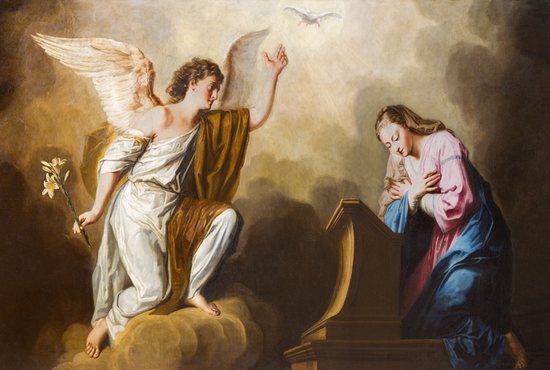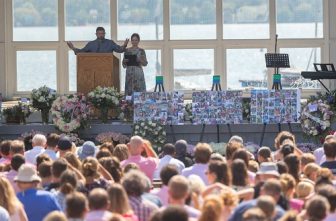
The familiar dialogue between the angel Gabriel and the Blessed Virgin Mary in the Gospel of Luke is the centerpiece of the Fourth Sunday of Advent. Even the Mass’s Opening Prayer (aka “collect”) sounds familiar, because it’s prayed at the end of the Angelus. Many churches have traditionally rung Angelus bells in the morning, at noon and in the evening, inviting bystanders to meditate on the Incarnation. Here’s an English version of the whole prayer:
V. The angel of the Lord declared unto Mary,
R. And she conceived by the Holy Spirit.
Hail Mary, full of grace …
V. Behold the handmaid of the Lord.
R. Be it done unto me according to your word.
Hail Mary, full of grace …
V. And the Word was made flesh. (Genuflect)
R. And dwelt among us.
Hail Mary, full of grace …
V. Pray for us, O holy Mother of God
R. That we may be made worthy of the promises of Christ.
Let us pray. Pour forth, we beseech you, O Lord, your grace into our hearts; that, we, to whom the incarnation of Christ your Son was made known by the message of an angel, may by his passion and cross, be brought to the glory of his resurrection. Through the same Christ our Lord. Amen.
St. Thomas Aquinas, perhaps the most brilliant Catholic theologian ever, was a Dominican. Members of this order do not adopt a name recalling a mystery of the faith, as do Carmelites (cf. St. John of the Cross or St. Thérèse of the Child Jesus). But if Dominicans did, many theologians opine that he would have chosen the name “St. Thomas of the Incarnation,” because he realized how that event radically changed humanity. When Mary welcomed Gabriel’s message, the Son of God took a body just like ours. Who are we, that God became one of us?! In a Christmas homily, St. Leo the Great exclaimed: “Christian, remember your dignity! And now that you share in God’s own nature, do not return by sin to your former base condition. Bear in mind who is your head and of whose body you are a member!”
Genuflecting during the Angelus invites us to admit our unworthiness to share the same flesh and blood as the Son of God. Similarly, while reciting the Creed, twice during the Church year — Christmas, and the solemnity of the Annunciation (March 25) — the Church calls the faithful not simply to bow, but to genuflect during the words, “And by the Holy Spirit (Jesus) was incarnate of the Virgin Mary and became man.”
No theologian could ever fully articulate the profound immensity of this reality; the world’s great artists and musicians, however, have given us hints of its awesomeness. We’re reminded of Fra Angelico’s stunning 15th century fresco “The Annunciation.” Likewise, in 1964, Franz Biebl composed an achingly beautiful musical version of the Angelus. A recording of the piece as performed by Chanticleer in our St. Paul Cathedral can be found on YouTube at tinyurl.com/2m2bkxpm.
The incarnation of the Son of God brought Jesus Christ into human history. This event also forever changed the life of the Virgin Mary, her holy spouse Joseph, and countless saints over thousands of years. Let our posture show that it impacts us, too: “At the name of Jesus, every knee should bend, of those in heaven and on earth and under the earth, and every tongue confess that Jesus Christ is Lord, to the glory of God the Father” (Phil. 2:10–11).
Father Margevicius is director of worship for the Archdiocese of St. Paul and Minneapolis.
Sunday, Dec. 24
Fourth Sunday of Advent



